Challenges Faced by Universal Healthcare in South Africa: A Study
VerifiedAdded on 2023/01/17
|57
|15653
|59
Thesis and Dissertation
AI Summary
This dissertation, submitted to Guglielmo Marconi University in partial fulfillment of an EMBA in Healthcare Management and Leadership, analyzes the challenges faced in implementing universal healthcare in South Africa. The research explores the existing healthcare landscape, divided into public and private sectors, and highlights the inequalities within the system. It identifies key issues such as unequal resource distribution due to urbanization, a shortage of healthcare workers, management and leadership crises, and the high burden of disease, including HIV/AIDS and TB. The study investigates the significance of these challenges and gaps in the existing research, setting objectives to understand the impact of these issues. The methodology includes a literature review, research questions, and a mixed-methods approach to data collection and analysis, incorporating both quantitative and qualitative data. The findings are discussed, and recommendations are provided to address the identified challenges and improve healthcare delivery in South Africa. The research emphasizes the importance of addressing these challenges to improve healthcare access and quality for all citizens.
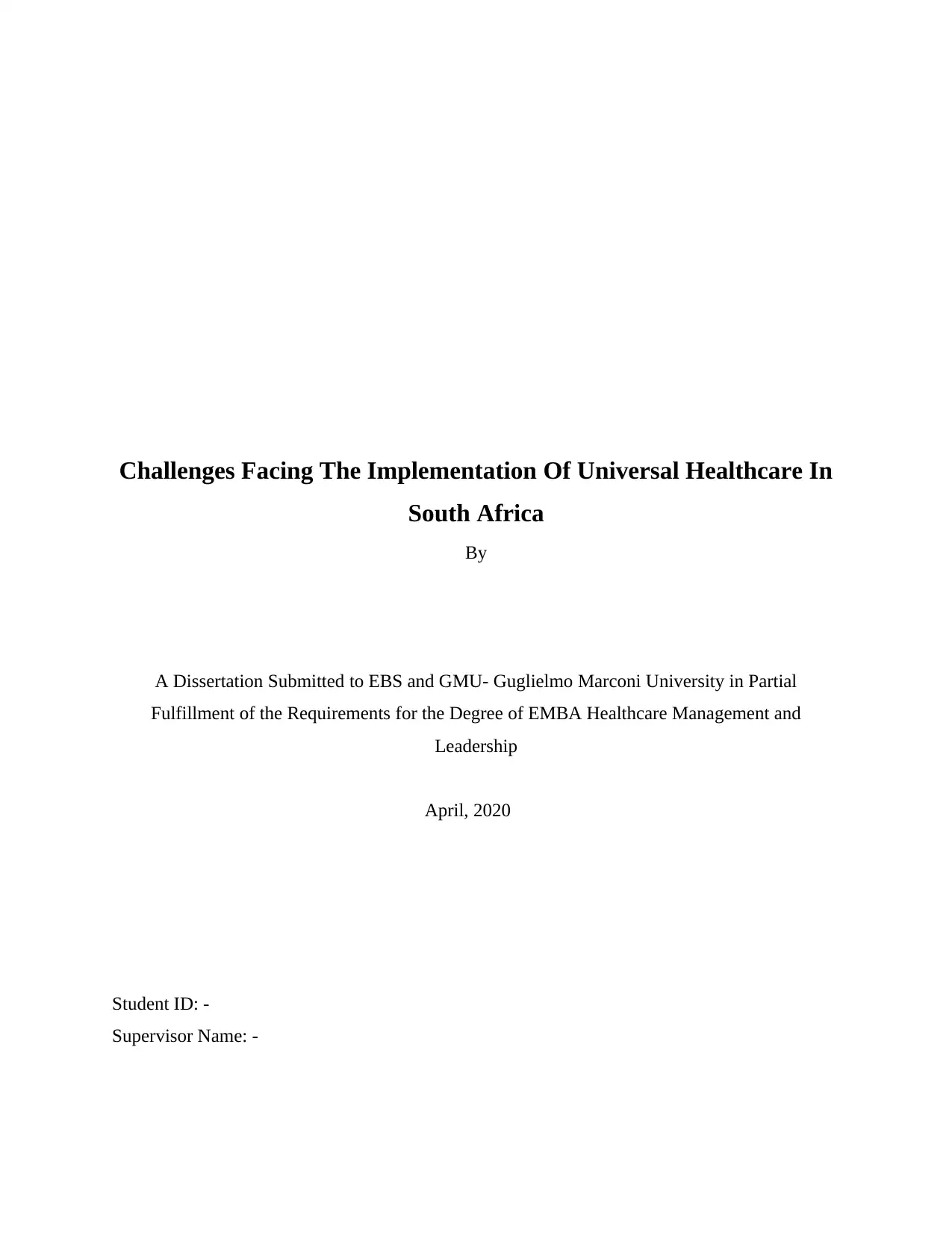
Challenges Facing The Implementation Of Universal Healthcare In
South Africa
By
A Dissertation Submitted to EBS and GMU- Guglielmo Marconi University in Partial
Fulfillment of the Requirements for the Degree of EMBA Healthcare Management and
Leadership
April, 2020
Student ID: -
Supervisor Name: -
South Africa
By
A Dissertation Submitted to EBS and GMU- Guglielmo Marconi University in Partial
Fulfillment of the Requirements for the Degree of EMBA Healthcare Management and
Leadership
April, 2020
Student ID: -
Supervisor Name: -
Paraphrase This Document
Need a fresh take? Get an instant paraphrase of this document with our AI Paraphraser
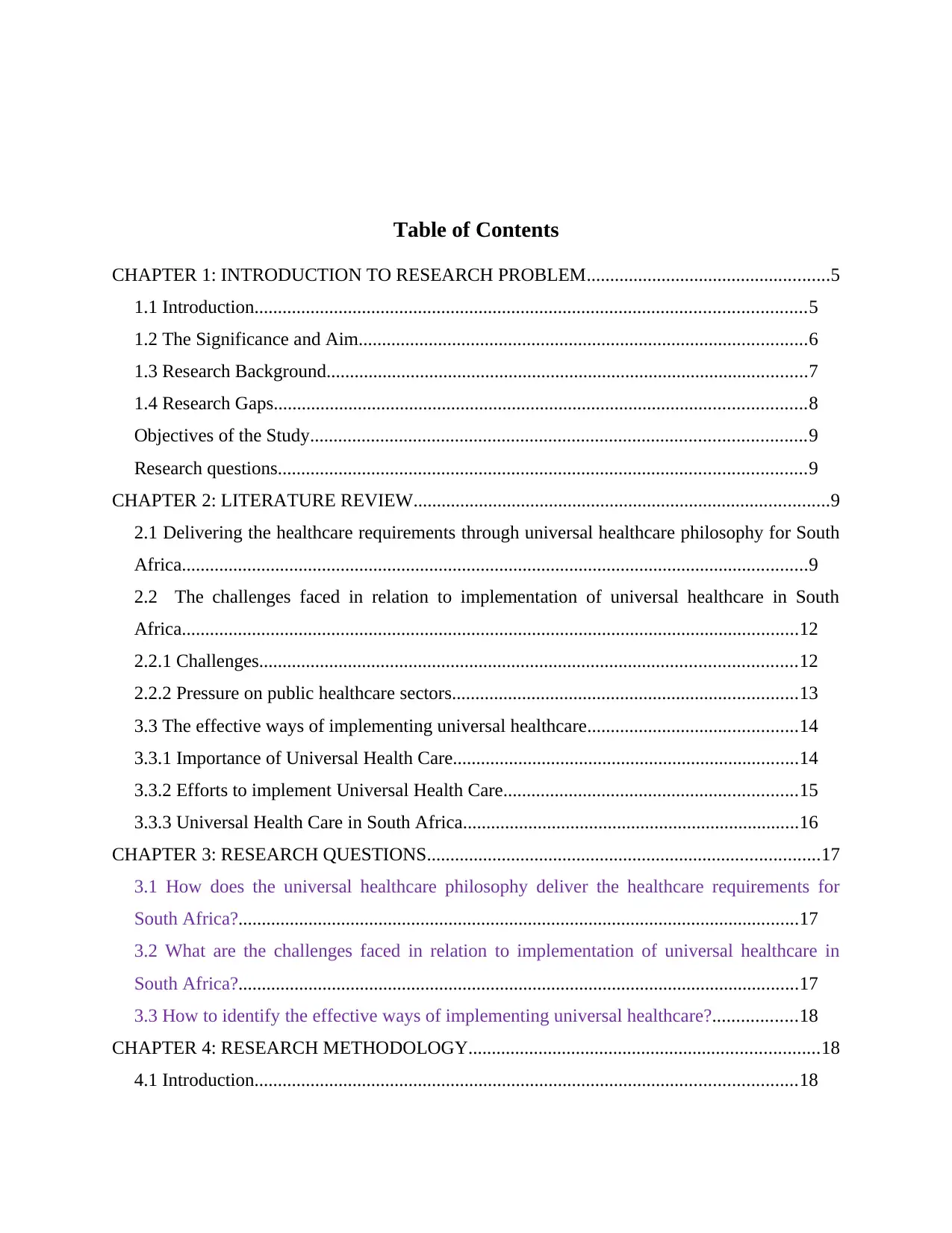
Table of Contents
CHAPTER 1: INTRODUCTION TO RESEARCH PROBLEM....................................................5
1.1 Introduction......................................................................................................................5
1.2 The Significance and Aim................................................................................................6
1.3 Research Background.......................................................................................................7
1.4 Research Gaps..................................................................................................................8
Objectives of the Study..........................................................................................................9
Research questions.................................................................................................................9
CHAPTER 2: LITERATURE REVIEW.........................................................................................9
2.1 Delivering the healthcare requirements through universal healthcare philosophy for South
Africa......................................................................................................................................9
2.2 The challenges faced in relation to implementation of universal healthcare in South
Africa....................................................................................................................................12
2.2.1 Challenges...................................................................................................................12
2.2.2 Pressure on public healthcare sectors..........................................................................13
3.3 The effective ways of implementing universal healthcare.............................................14
3.3.1 Importance of Universal Health Care..........................................................................14
3.3.2 Efforts to implement Universal Health Care...............................................................15
3.3.3 Universal Health Care in South Africa........................................................................16
CHAPTER 3: RESEARCH QUESTIONS....................................................................................17
3.1 How does the universal healthcare philosophy deliver the healthcare requirements for
South Africa?........................................................................................................................17
3.2 What are the challenges faced in relation to implementation of universal healthcare in
South Africa?........................................................................................................................17
3.3 How to identify the effective ways of implementing universal healthcare?..................18
CHAPTER 4: RESEARCH METHODOLOGY...........................................................................18
4.1 Introduction....................................................................................................................18
CHAPTER 1: INTRODUCTION TO RESEARCH PROBLEM....................................................5
1.1 Introduction......................................................................................................................5
1.2 The Significance and Aim................................................................................................6
1.3 Research Background.......................................................................................................7
1.4 Research Gaps..................................................................................................................8
Objectives of the Study..........................................................................................................9
Research questions.................................................................................................................9
CHAPTER 2: LITERATURE REVIEW.........................................................................................9
2.1 Delivering the healthcare requirements through universal healthcare philosophy for South
Africa......................................................................................................................................9
2.2 The challenges faced in relation to implementation of universal healthcare in South
Africa....................................................................................................................................12
2.2.1 Challenges...................................................................................................................12
2.2.2 Pressure on public healthcare sectors..........................................................................13
3.3 The effective ways of implementing universal healthcare.............................................14
3.3.1 Importance of Universal Health Care..........................................................................14
3.3.2 Efforts to implement Universal Health Care...............................................................15
3.3.3 Universal Health Care in South Africa........................................................................16
CHAPTER 3: RESEARCH QUESTIONS....................................................................................17
3.1 How does the universal healthcare philosophy deliver the healthcare requirements for
South Africa?........................................................................................................................17
3.2 What are the challenges faced in relation to implementation of universal healthcare in
South Africa?........................................................................................................................17
3.3 How to identify the effective ways of implementing universal healthcare?..................18
CHAPTER 4: RESEARCH METHODOLOGY...........................................................................18
4.1 Introduction....................................................................................................................18
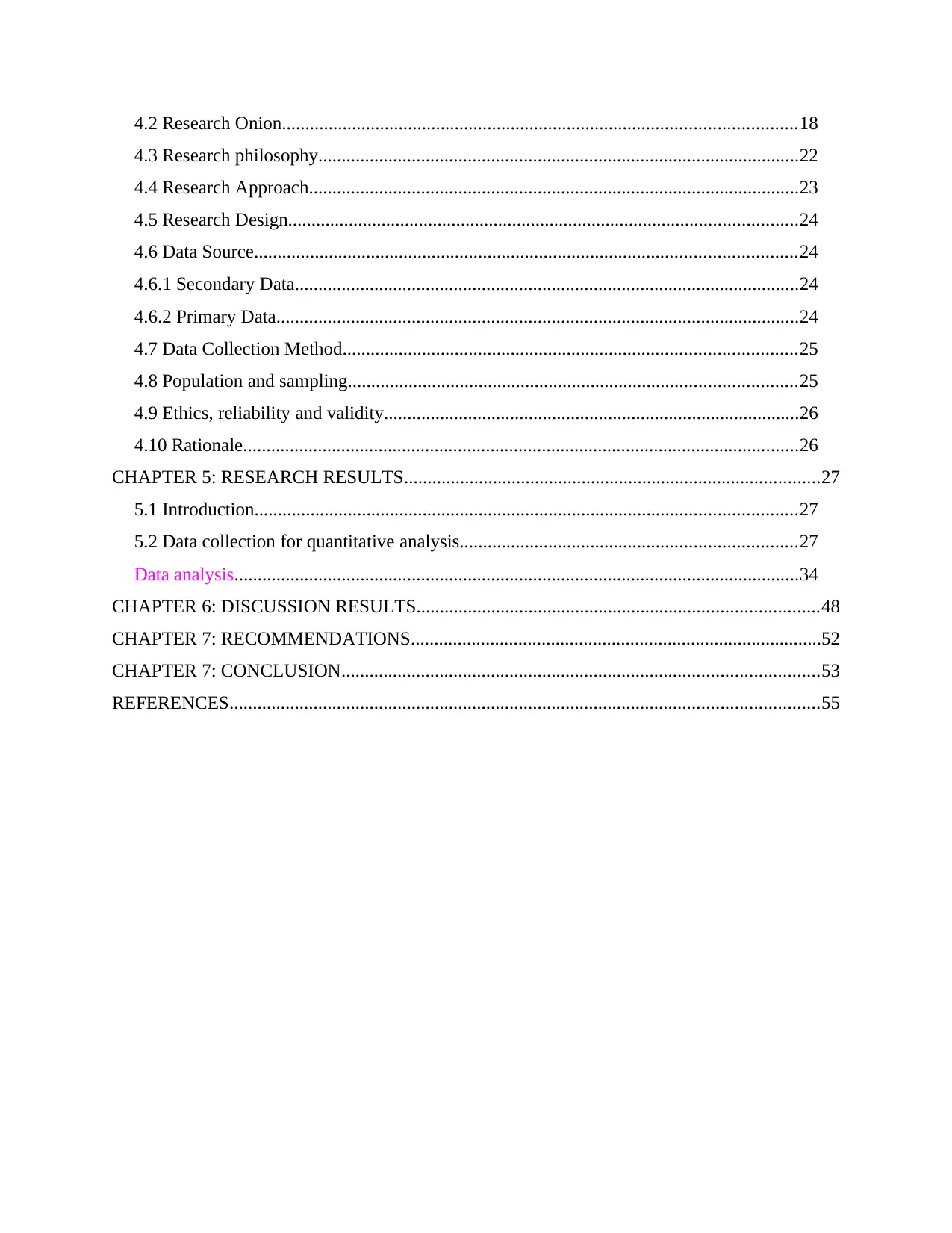
4.2 Research Onion..............................................................................................................18
4.3 Research philosophy.......................................................................................................22
4.4 Research Approach.........................................................................................................23
4.5 Research Design.............................................................................................................24
4.6 Data Source....................................................................................................................24
4.6.1 Secondary Data............................................................................................................24
4.6.2 Primary Data................................................................................................................24
4.7 Data Collection Method.................................................................................................25
4.8 Population and sampling................................................................................................25
4.9 Ethics, reliability and validity.........................................................................................26
4.10 Rationale.......................................................................................................................26
CHAPTER 5: RESEARCH RESULTS.........................................................................................27
5.1 Introduction....................................................................................................................27
5.2 Data collection for quantitative analysis........................................................................27
Data analysis.........................................................................................................................34
CHAPTER 6: DISCUSSION RESULTS......................................................................................48
CHAPTER 7: RECOMMENDATIONS........................................................................................52
CHAPTER 7: CONCLUSION......................................................................................................53
REFERENCES..............................................................................................................................55
4.3 Research philosophy.......................................................................................................22
4.4 Research Approach.........................................................................................................23
4.5 Research Design.............................................................................................................24
4.6 Data Source....................................................................................................................24
4.6.1 Secondary Data............................................................................................................24
4.6.2 Primary Data................................................................................................................24
4.7 Data Collection Method.................................................................................................25
4.8 Population and sampling................................................................................................25
4.9 Ethics, reliability and validity.........................................................................................26
4.10 Rationale.......................................................................................................................26
CHAPTER 5: RESEARCH RESULTS.........................................................................................27
5.1 Introduction....................................................................................................................27
5.2 Data collection for quantitative analysis........................................................................27
Data analysis.........................................................................................................................34
CHAPTER 6: DISCUSSION RESULTS......................................................................................48
CHAPTER 7: RECOMMENDATIONS........................................................................................52
CHAPTER 7: CONCLUSION......................................................................................................53
REFERENCES..............................................................................................................................55
⊘ This is a preview!⊘
Do you want full access?
Subscribe today to unlock all pages.

Trusted by 1+ million students worldwide

Paraphrase This Document
Need a fresh take? Get an instant paraphrase of this document with our AI Paraphraser
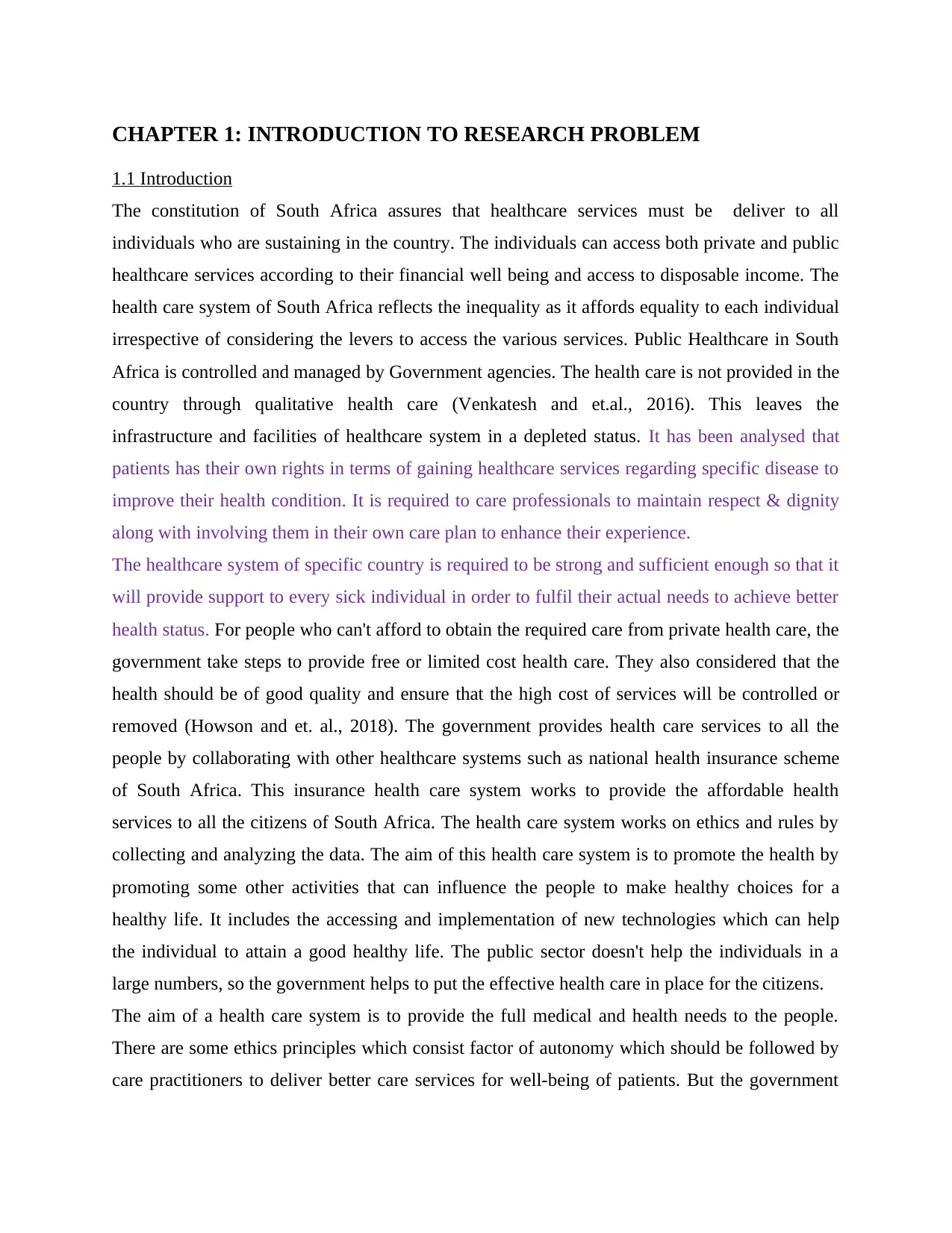
CHAPTER 1: INTRODUCTION TO RESEARCH PROBLEM
1.1 Introduction
The constitution of South Africa assures that healthcare services must be deliver to all
individuals who are sustaining in the country. The individuals can access both private and public
healthcare services according to their financial well being and access to disposable income. The
health care system of South Africa reflects the inequality as it affords equality to each individual
irrespective of considering the levers to access the various services. Public Healthcare in South
Africa is controlled and managed by Government agencies. The health care is not provided in the
country through qualitative health care (Venkatesh and et.al., 2016). This leaves the
infrastructure and facilities of healthcare system in a depleted status. It has been analysed that
patients has their own rights in terms of gaining healthcare services regarding specific disease to
improve their health condition. It is required to care professionals to maintain respect & dignity
along with involving them in their own care plan to enhance their experience.
The healthcare system of specific country is required to be strong and sufficient enough so that it
will provide support to every sick individual in order to fulfil their actual needs to achieve better
health status. For people who can't afford to obtain the required care from private health care, the
government take steps to provide free or limited cost health care. They also considered that the
health should be of good quality and ensure that the high cost of services will be controlled or
removed (Howson and et. al., 2018). The government provides health care services to all the
people by collaborating with other healthcare systems such as national health insurance scheme
of South Africa. This insurance health care system works to provide the affordable health
services to all the citizens of South Africa. The health care system works on ethics and rules by
collecting and analyzing the data. The aim of this health care system is to promote the health by
promoting some other activities that can influence the people to make healthy choices for a
healthy life. It includes the accessing and implementation of new technologies which can help
the individual to attain a good healthy life. The public sector doesn't help the individuals in a
large numbers, so the government helps to put the effective health care in place for the citizens.
The aim of a health care system is to provide the full medical and health needs to the people.
There are some ethics principles which consist factor of autonomy which should be followed by
care practitioners to deliver better care services for well-being of patients. But the government
1.1 Introduction
The constitution of South Africa assures that healthcare services must be deliver to all
individuals who are sustaining in the country. The individuals can access both private and public
healthcare services according to their financial well being and access to disposable income. The
health care system of South Africa reflects the inequality as it affords equality to each individual
irrespective of considering the levers to access the various services. Public Healthcare in South
Africa is controlled and managed by Government agencies. The health care is not provided in the
country through qualitative health care (Venkatesh and et.al., 2016). This leaves the
infrastructure and facilities of healthcare system in a depleted status. It has been analysed that
patients has their own rights in terms of gaining healthcare services regarding specific disease to
improve their health condition. It is required to care professionals to maintain respect & dignity
along with involving them in their own care plan to enhance their experience.
The healthcare system of specific country is required to be strong and sufficient enough so that it
will provide support to every sick individual in order to fulfil their actual needs to achieve better
health status. For people who can't afford to obtain the required care from private health care, the
government take steps to provide free or limited cost health care. They also considered that the
health should be of good quality and ensure that the high cost of services will be controlled or
removed (Howson and et. al., 2018). The government provides health care services to all the
people by collaborating with other healthcare systems such as national health insurance scheme
of South Africa. This insurance health care system works to provide the affordable health
services to all the citizens of South Africa. The health care system works on ethics and rules by
collecting and analyzing the data. The aim of this health care system is to promote the health by
promoting some other activities that can influence the people to make healthy choices for a
healthy life. It includes the accessing and implementation of new technologies which can help
the individual to attain a good healthy life. The public sector doesn't help the individuals in a
large numbers, so the government helps to put the effective health care in place for the citizens.
The aim of a health care system is to provide the full medical and health needs to the people.
There are some ethics principles which consist factor of autonomy which should be followed by
care practitioners to deliver better care services for well-being of patients. But the government
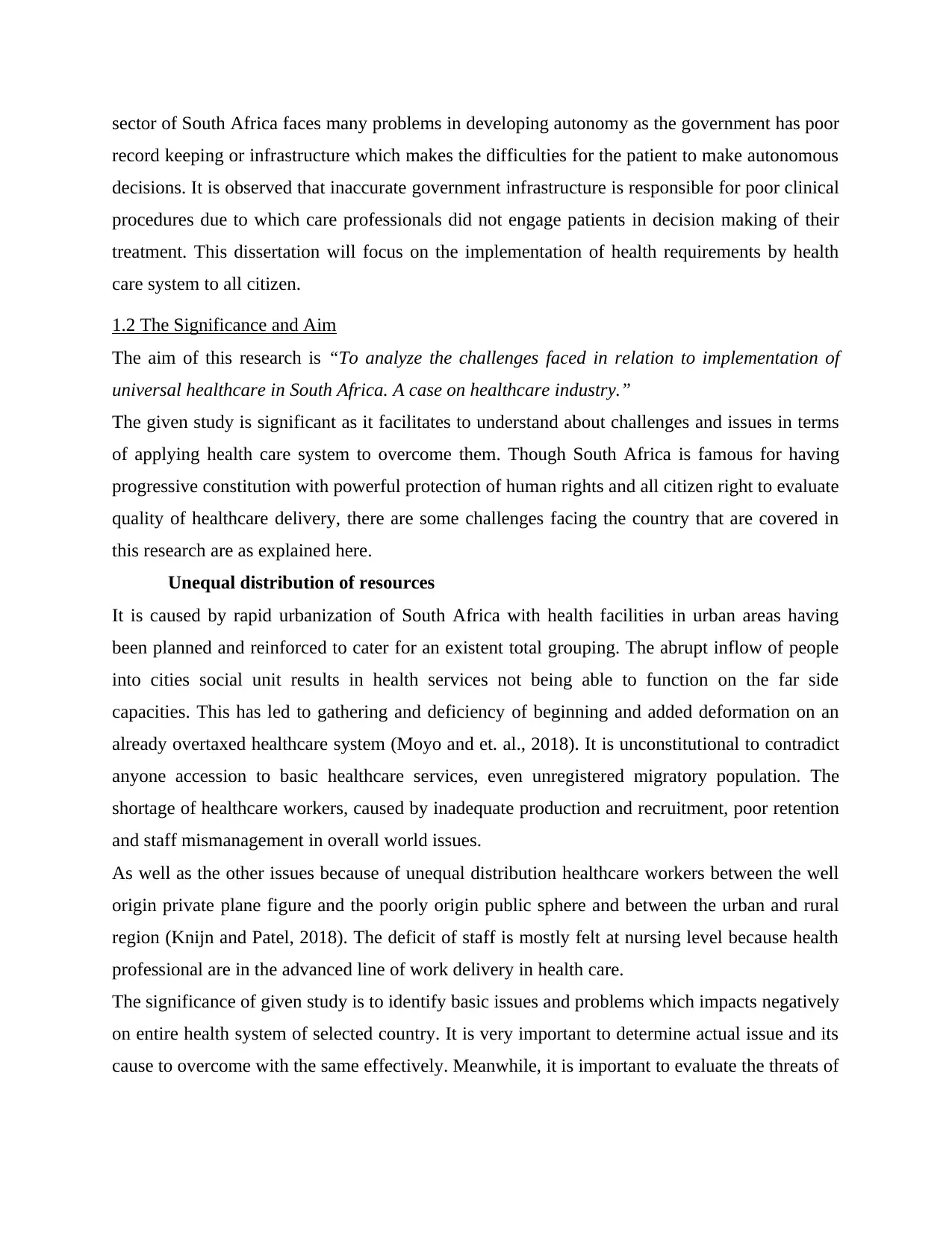
sector of South Africa faces many problems in developing autonomy as the government has poor
record keeping or infrastructure which makes the difficulties for the patient to make autonomous
decisions. It is observed that inaccurate government infrastructure is responsible for poor clinical
procedures due to which care professionals did not engage patients in decision making of their
treatment. This dissertation will focus on the implementation of health requirements by health
care system to all citizen.
1.2 The Significance and Aim
The aim of this research is “To analyze the challenges faced in relation to implementation of
universal healthcare in South Africa. A case on healthcare industry.”
The given study is significant as it facilitates to understand about challenges and issues in terms
of applying health care system to overcome them. Though South Africa is famous for having
progressive constitution with powerful protection of human rights and all citizen right to evaluate
quality of healthcare delivery, there are some challenges facing the country that are covered in
this research are as explained here.
Unequal distribution of resources
It is caused by rapid urbanization of South Africa with health facilities in urban areas having
been planned and reinforced to cater for an existent total grouping. The abrupt inflow of people
into cities social unit results in health services not being able to function on the far side
capacities. This has led to gathering and deficiency of beginning and added deformation on an
already overtaxed healthcare system (Moyo and et. al., 2018). It is unconstitutional to contradict
anyone accession to basic healthcare services, even unregistered migratory population. The
shortage of healthcare workers, caused by inadequate production and recruitment, poor retention
and staff mismanagement in overall world issues.
As well as the other issues because of unequal distribution healthcare workers between the well
origin private plane figure and the poorly origin public sphere and between the urban and rural
region (Knijn and Patel, 2018). The deficit of staff is mostly felt at nursing level because health
professional are in the advanced line of work delivery in health care.
The significance of given study is to identify basic issues and problems which impacts negatively
on entire health system of selected country. It is very important to determine actual issue and its
cause to overcome with the same effectively. Meanwhile, it is important to evaluate the threats of
record keeping or infrastructure which makes the difficulties for the patient to make autonomous
decisions. It is observed that inaccurate government infrastructure is responsible for poor clinical
procedures due to which care professionals did not engage patients in decision making of their
treatment. This dissertation will focus on the implementation of health requirements by health
care system to all citizen.
1.2 The Significance and Aim
The aim of this research is “To analyze the challenges faced in relation to implementation of
universal healthcare in South Africa. A case on healthcare industry.”
The given study is significant as it facilitates to understand about challenges and issues in terms
of applying health care system to overcome them. Though South Africa is famous for having
progressive constitution with powerful protection of human rights and all citizen right to evaluate
quality of healthcare delivery, there are some challenges facing the country that are covered in
this research are as explained here.
Unequal distribution of resources
It is caused by rapid urbanization of South Africa with health facilities in urban areas having
been planned and reinforced to cater for an existent total grouping. The abrupt inflow of people
into cities social unit results in health services not being able to function on the far side
capacities. This has led to gathering and deficiency of beginning and added deformation on an
already overtaxed healthcare system (Moyo and et. al., 2018). It is unconstitutional to contradict
anyone accession to basic healthcare services, even unregistered migratory population. The
shortage of healthcare workers, caused by inadequate production and recruitment, poor retention
and staff mismanagement in overall world issues.
As well as the other issues because of unequal distribution healthcare workers between the well
origin private plane figure and the poorly origin public sphere and between the urban and rural
region (Knijn and Patel, 2018). The deficit of staff is mostly felt at nursing level because health
professional are in the advanced line of work delivery in health care.
The significance of given study is to identify basic issues and problems which impacts negatively
on entire health system of selected country. It is very important to determine actual issue and its
cause to overcome with the same effectively. Meanwhile, it is important to evaluate the threats of
⊘ This is a preview!⊘
Do you want full access?
Subscribe today to unlock all pages.

Trusted by 1+ million students worldwide
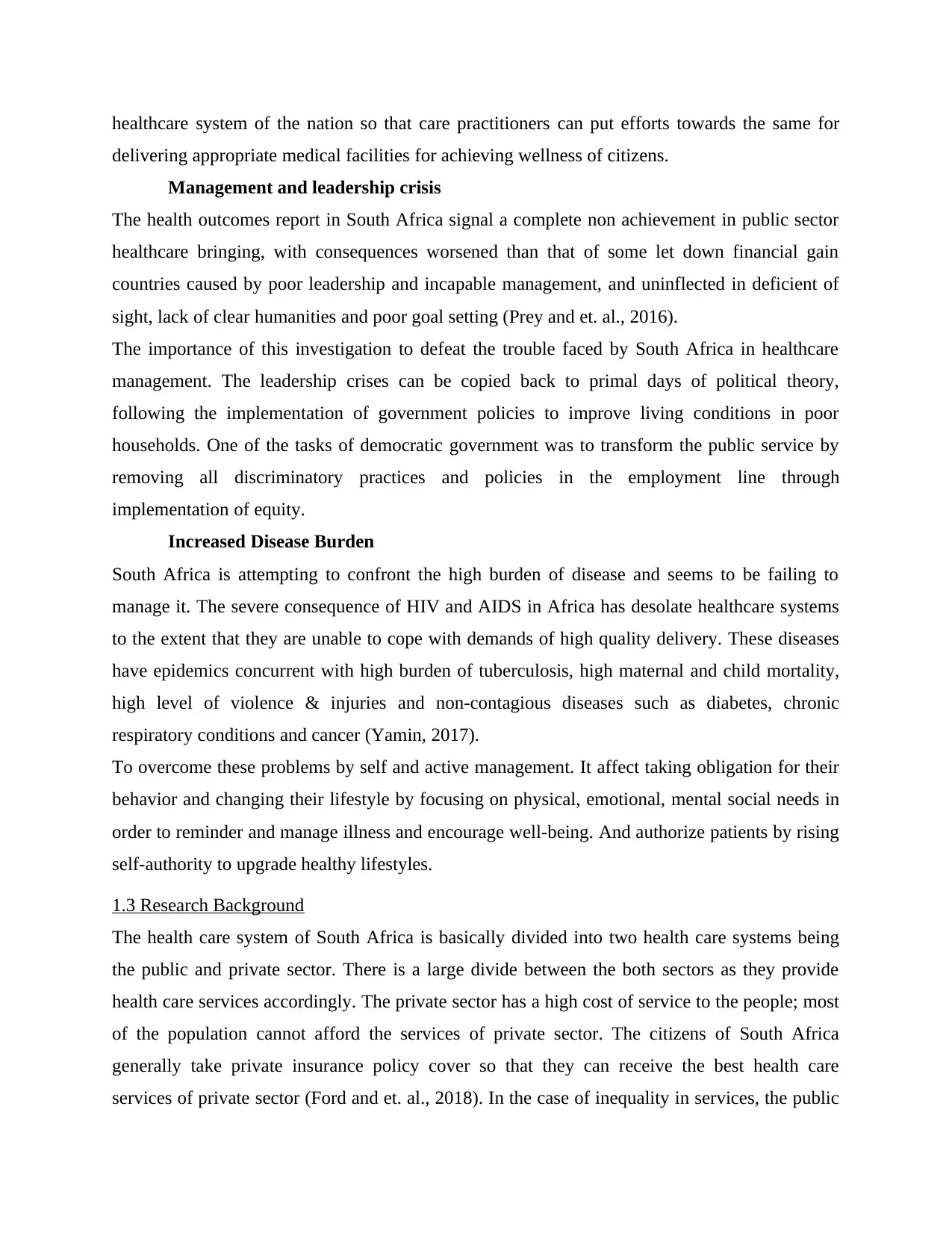
healthcare system of the nation so that care practitioners can put efforts towards the same for
delivering appropriate medical facilities for achieving wellness of citizens.
Management and leadership crisis
The health outcomes report in South Africa signal a complete non achievement in public sector
healthcare bringing, with consequences worsened than that of some let down financial gain
countries caused by poor leadership and incapable management, and uninflected in deficient of
sight, lack of clear humanities and poor goal setting (Prey and et. al., 2016).
The importance of this investigation to defeat the trouble faced by South Africa in healthcare
management. The leadership crises can be copied back to primal days of political theory,
following the implementation of government policies to improve living conditions in poor
households. One of the tasks of democratic government was to transform the public service by
removing all discriminatory practices and policies in the employment line through
implementation of equity.
Increased Disease Burden
South Africa is attempting to confront the high burden of disease and seems to be failing to
manage it. The severe consequence of HIV and AIDS in Africa has desolate healthcare systems
to the extent that they are unable to cope with demands of high quality delivery. These diseases
have epidemics concurrent with high burden of tuberculosis, high maternal and child mortality,
high level of violence & injuries and non-contagious diseases such as diabetes, chronic
respiratory conditions and cancer (Yamin, 2017).
To overcome these problems by self and active management. It affect taking obligation for their
behavior and changing their lifestyle by focusing on physical, emotional, mental social needs in
order to reminder and manage illness and encourage well-being. And authorize patients by rising
self-authority to upgrade healthy lifestyles.
1.3 Research Background
The health care system of South Africa is basically divided into two health care systems being
the public and private sector. There is a large divide between the both sectors as they provide
health care services accordingly. The private sector has a high cost of service to the people; most
of the population cannot afford the services of private sector. The citizens of South Africa
generally take private insurance policy cover so that they can receive the best health care
services of private sector (Ford and et. al., 2018). In the case of inequality in services, the public
delivering appropriate medical facilities for achieving wellness of citizens.
Management and leadership crisis
The health outcomes report in South Africa signal a complete non achievement in public sector
healthcare bringing, with consequences worsened than that of some let down financial gain
countries caused by poor leadership and incapable management, and uninflected in deficient of
sight, lack of clear humanities and poor goal setting (Prey and et. al., 2016).
The importance of this investigation to defeat the trouble faced by South Africa in healthcare
management. The leadership crises can be copied back to primal days of political theory,
following the implementation of government policies to improve living conditions in poor
households. One of the tasks of democratic government was to transform the public service by
removing all discriminatory practices and policies in the employment line through
implementation of equity.
Increased Disease Burden
South Africa is attempting to confront the high burden of disease and seems to be failing to
manage it. The severe consequence of HIV and AIDS in Africa has desolate healthcare systems
to the extent that they are unable to cope with demands of high quality delivery. These diseases
have epidemics concurrent with high burden of tuberculosis, high maternal and child mortality,
high level of violence & injuries and non-contagious diseases such as diabetes, chronic
respiratory conditions and cancer (Yamin, 2017).
To overcome these problems by self and active management. It affect taking obligation for their
behavior and changing their lifestyle by focusing on physical, emotional, mental social needs in
order to reminder and manage illness and encourage well-being. And authorize patients by rising
self-authority to upgrade healthy lifestyles.
1.3 Research Background
The health care system of South Africa is basically divided into two health care systems being
the public and private sector. There is a large divide between the both sectors as they provide
health care services accordingly. The private sector has a high cost of service to the people; most
of the population cannot afford the services of private sector. The citizens of South Africa
generally take private insurance policy cover so that they can receive the best health care
services of private sector (Ford and et. al., 2018). In the case of inequality in services, the public
Paraphrase This Document
Need a fresh take? Get an instant paraphrase of this document with our AI Paraphraser
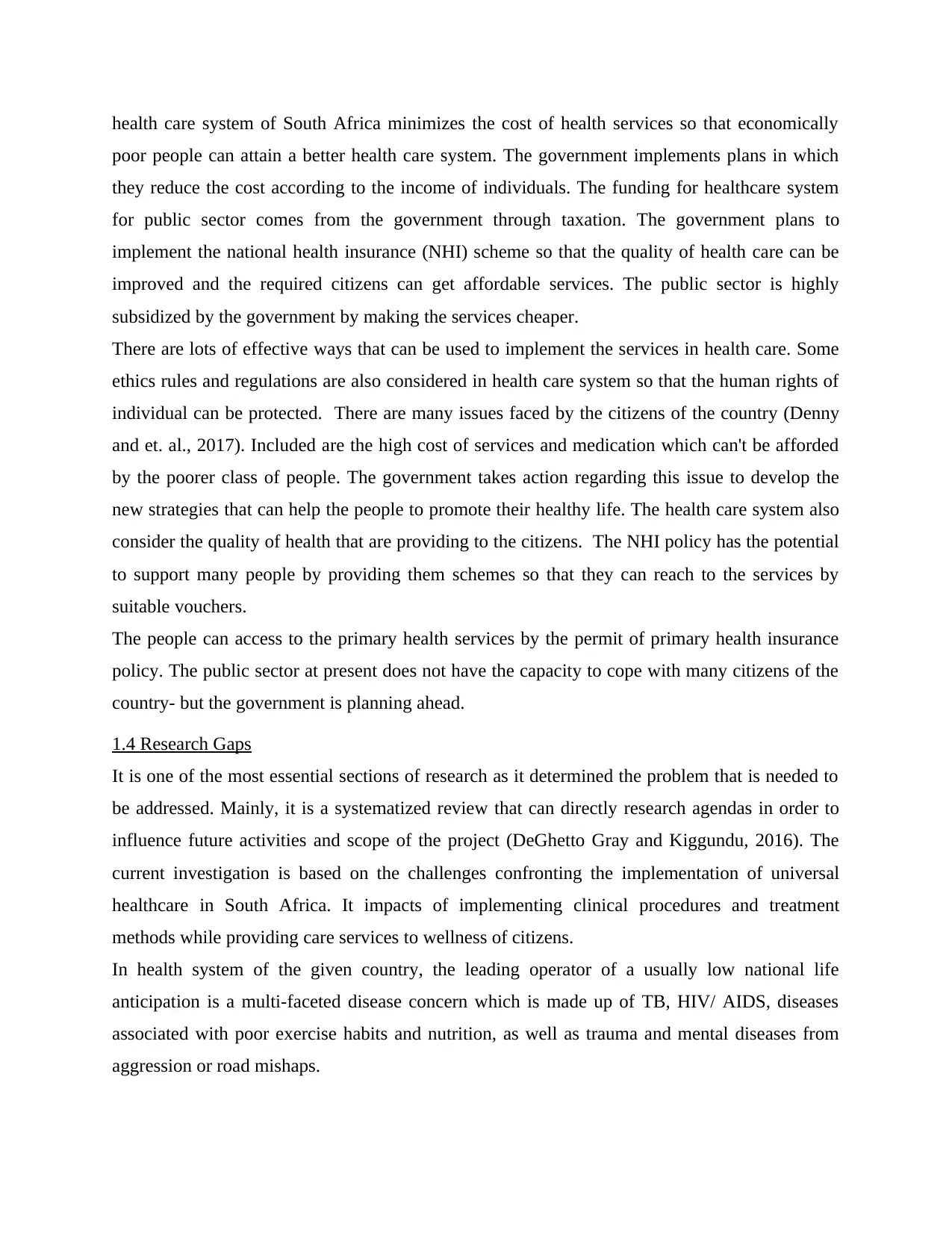
health care system of South Africa minimizes the cost of health services so that economically
poor people can attain a better health care system. The government implements plans in which
they reduce the cost according to the income of individuals. The funding for healthcare system
for public sector comes from the government through taxation. The government plans to
implement the national health insurance (NHI) scheme so that the quality of health care can be
improved and the required citizens can get affordable services. The public sector is highly
subsidized by the government by making the services cheaper.
There are lots of effective ways that can be used to implement the services in health care. Some
ethics rules and regulations are also considered in health care system so that the human rights of
individual can be protected. There are many issues faced by the citizens of the country (Denny
and et. al., 2017). Included are the high cost of services and medication which can't be afforded
by the poorer class of people. The government takes action regarding this issue to develop the
new strategies that can help the people to promote their healthy life. The health care system also
consider the quality of health that are providing to the citizens. The NHI policy has the potential
to support many people by providing them schemes so that they can reach to the services by
suitable vouchers.
The people can access to the primary health services by the permit of primary health insurance
policy. The public sector at present does not have the capacity to cope with many citizens of the
country- but the government is planning ahead.
1.4 Research Gaps
It is one of the most essential sections of research as it determined the problem that is needed to
be addressed. Mainly, it is a systematized review that can directly research agendas in order to
influence future activities and scope of the project (DeGhetto Gray and Kiggundu, 2016). The
current investigation is based on the challenges confronting the implementation of universal
healthcare in South Africa. It impacts of implementing clinical procedures and treatment
methods while providing care services to wellness of citizens.
In health system of the given country, the leading operator of a usually low national life
anticipation is a multi-faceted disease concern which is made up of TB, HIV/ AIDS, diseases
associated with poor exercise habits and nutrition, as well as trauma and mental diseases from
aggression or road mishaps.
poor people can attain a better health care system. The government implements plans in which
they reduce the cost according to the income of individuals. The funding for healthcare system
for public sector comes from the government through taxation. The government plans to
implement the national health insurance (NHI) scheme so that the quality of health care can be
improved and the required citizens can get affordable services. The public sector is highly
subsidized by the government by making the services cheaper.
There are lots of effective ways that can be used to implement the services in health care. Some
ethics rules and regulations are also considered in health care system so that the human rights of
individual can be protected. There are many issues faced by the citizens of the country (Denny
and et. al., 2017). Included are the high cost of services and medication which can't be afforded
by the poorer class of people. The government takes action regarding this issue to develop the
new strategies that can help the people to promote their healthy life. The health care system also
consider the quality of health that are providing to the citizens. The NHI policy has the potential
to support many people by providing them schemes so that they can reach to the services by
suitable vouchers.
The people can access to the primary health services by the permit of primary health insurance
policy. The public sector at present does not have the capacity to cope with many citizens of the
country- but the government is planning ahead.
1.4 Research Gaps
It is one of the most essential sections of research as it determined the problem that is needed to
be addressed. Mainly, it is a systematized review that can directly research agendas in order to
influence future activities and scope of the project (DeGhetto Gray and Kiggundu, 2016). The
current investigation is based on the challenges confronting the implementation of universal
healthcare in South Africa. It impacts of implementing clinical procedures and treatment
methods while providing care services to wellness of citizens.
In health system of the given country, the leading operator of a usually low national life
anticipation is a multi-faceted disease concern which is made up of TB, HIV/ AIDS, diseases
associated with poor exercise habits and nutrition, as well as trauma and mental diseases from
aggression or road mishaps.
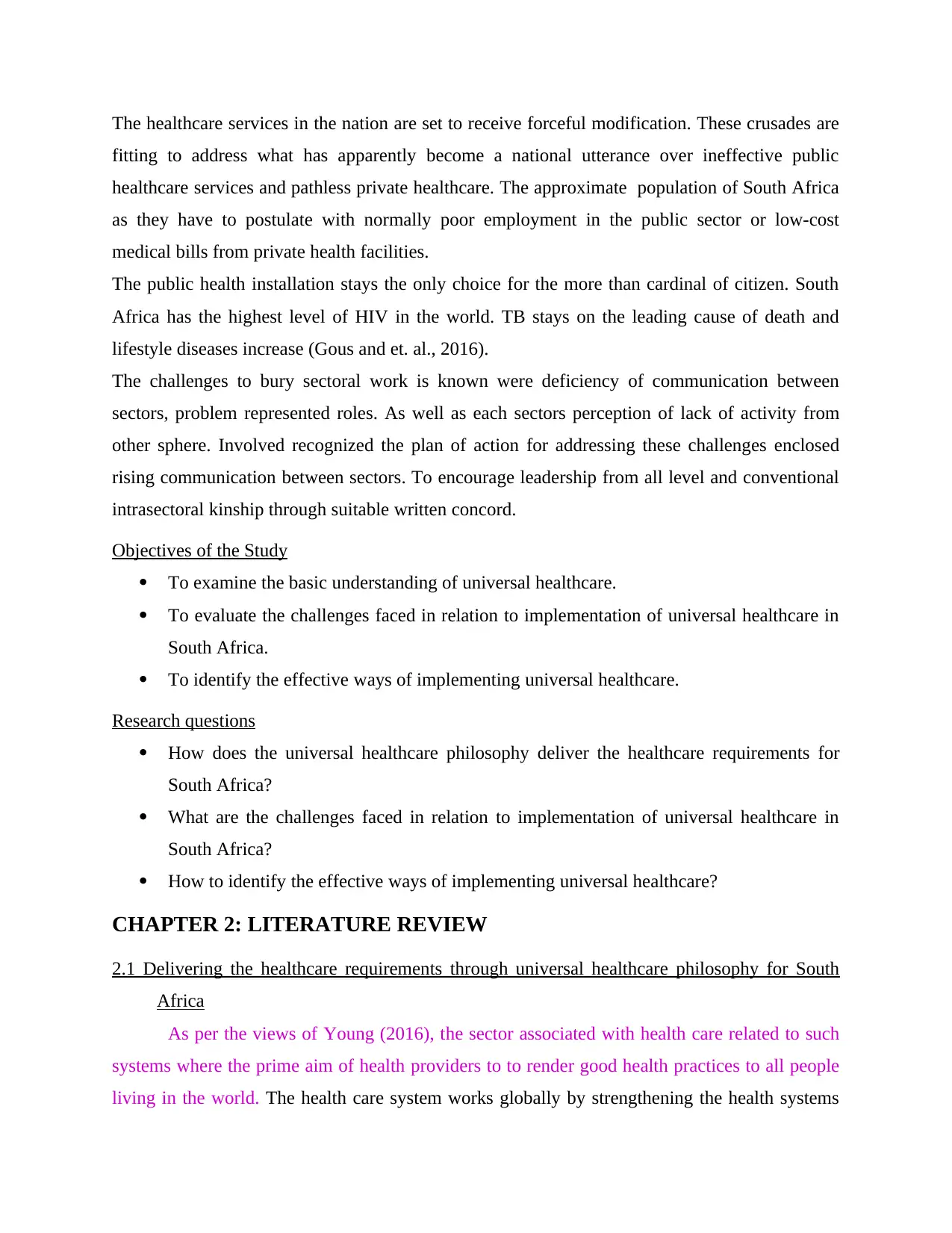
The healthcare services in the nation are set to receive forceful modification. These crusades are
fitting to address what has apparently become a national utterance over ineffective public
healthcare services and pathless private healthcare. The approximate population of South Africa
as they have to postulate with normally poor employment in the public sector or low-cost
medical bills from private health facilities.
The public health installation stays the only choice for the more than cardinal of citizen. South
Africa has the highest level of HIV in the world. TB stays on the leading cause of death and
lifestyle diseases increase (Gous and et. al., 2016).
The challenges to bury sectoral work is known were deficiency of communication between
sectors, problem represented roles. As well as each sectors perception of lack of activity from
other sphere. Involved recognized the plan of action for addressing these challenges enclosed
rising communication between sectors. To encourage leadership from all level and conventional
intrasectoral kinship through suitable written concord.
Objectives of the Study
To examine the basic understanding of universal healthcare.
To evaluate the challenges faced in relation to implementation of universal healthcare in
South Africa.
To identify the effective ways of implementing universal healthcare.
Research questions
How does the universal healthcare philosophy deliver the healthcare requirements for
South Africa?
What are the challenges faced in relation to implementation of universal healthcare in
South Africa?
How to identify the effective ways of implementing universal healthcare?
CHAPTER 2: LITERATURE REVIEW
2.1 Delivering the healthcare requirements through universal healthcare philosophy for South
Africa
As per the views of Young (2016), the sector associated with health care related to such
systems where the prime aim of health providers to to render good health practices to all people
living in the world. The health care system works globally by strengthening the health systems
fitting to address what has apparently become a national utterance over ineffective public
healthcare services and pathless private healthcare. The approximate population of South Africa
as they have to postulate with normally poor employment in the public sector or low-cost
medical bills from private health facilities.
The public health installation stays the only choice for the more than cardinal of citizen. South
Africa has the highest level of HIV in the world. TB stays on the leading cause of death and
lifestyle diseases increase (Gous and et. al., 2016).
The challenges to bury sectoral work is known were deficiency of communication between
sectors, problem represented roles. As well as each sectors perception of lack of activity from
other sphere. Involved recognized the plan of action for addressing these challenges enclosed
rising communication between sectors. To encourage leadership from all level and conventional
intrasectoral kinship through suitable written concord.
Objectives of the Study
To examine the basic understanding of universal healthcare.
To evaluate the challenges faced in relation to implementation of universal healthcare in
South Africa.
To identify the effective ways of implementing universal healthcare.
Research questions
How does the universal healthcare philosophy deliver the healthcare requirements for
South Africa?
What are the challenges faced in relation to implementation of universal healthcare in
South Africa?
How to identify the effective ways of implementing universal healthcare?
CHAPTER 2: LITERATURE REVIEW
2.1 Delivering the healthcare requirements through universal healthcare philosophy for South
Africa
As per the views of Young (2016), the sector associated with health care related to such
systems where the prime aim of health providers to to render good health practices to all people
living in the world. The health care system works globally by strengthening the health systems
⊘ This is a preview!⊘
Do you want full access?
Subscribe today to unlock all pages.

Trusted by 1+ million students worldwide
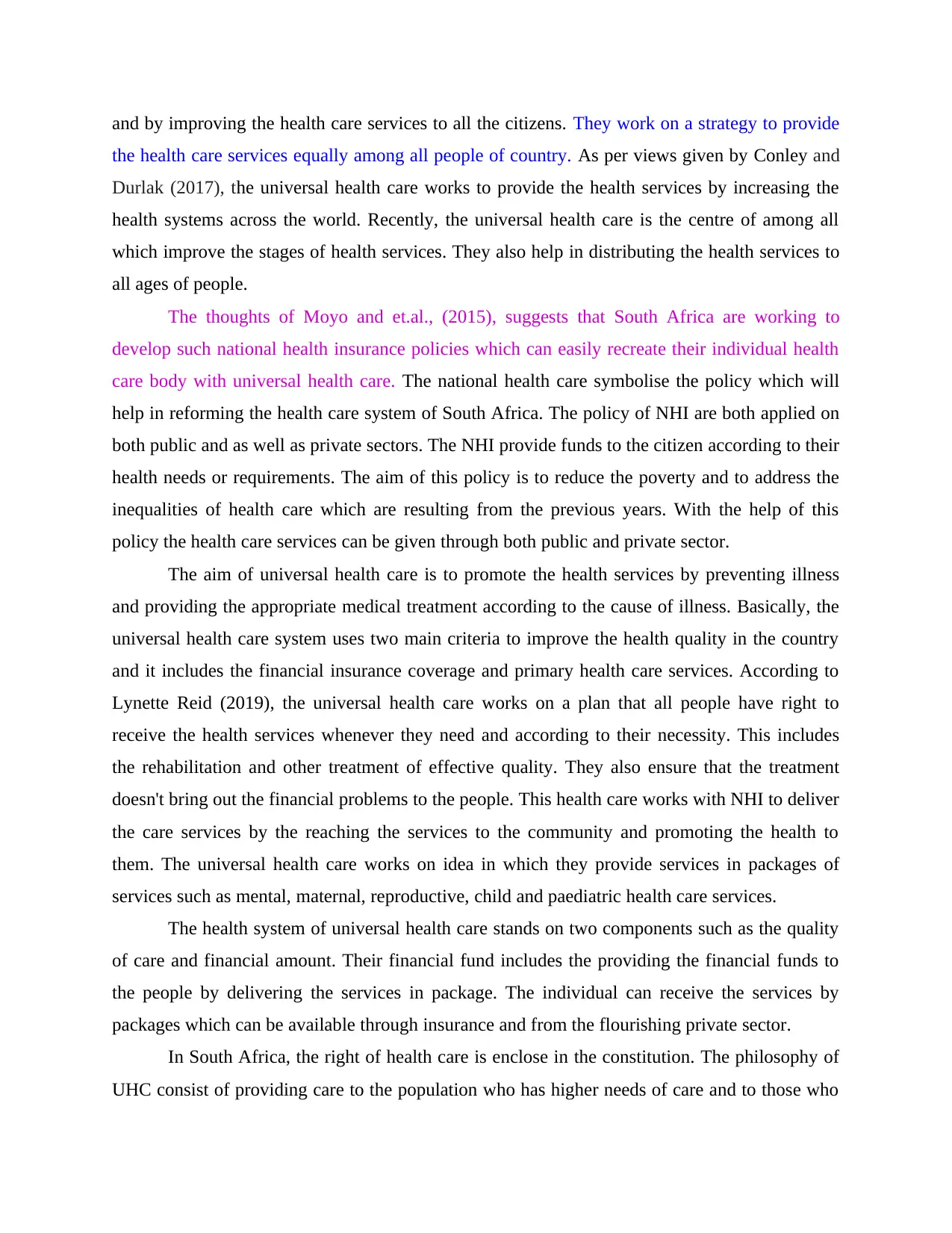
and by improving the health care services to all the citizens. They work on a strategy to provide
the health care services equally among all people of country. As per views given by Conley and
Durlak (2017), the universal health care works to provide the health services by increasing the
health systems across the world. Recently, the universal health care is the centre of among all
which improve the stages of health services. They also help in distributing the health services to
all ages of people.
The thoughts of Moyo and et.al., (2015), suggests that South Africa are working to
develop such national health insurance policies which can easily recreate their individual health
care body with universal health care. The national health care symbolise the policy which will
help in reforming the health care system of South Africa. The policy of NHI are both applied on
both public and as well as private sectors. The NHI provide funds to the citizen according to their
health needs or requirements. The aim of this policy is to reduce the poverty and to address the
inequalities of health care which are resulting from the previous years. With the help of this
policy the health care services can be given through both public and private sector.
The aim of universal health care is to promote the health services by preventing illness
and providing the appropriate medical treatment according to the cause of illness. Basically, the
universal health care system uses two main criteria to improve the health quality in the country
and it includes the financial insurance coverage and primary health care services. According to
Lynette Reid (2019), the universal health care works on a plan that all people have right to
receive the health services whenever they need and according to their necessity. This includes
the rehabilitation and other treatment of effective quality. They also ensure that the treatment
doesn't bring out the financial problems to the people. This health care works with NHI to deliver
the care services by the reaching the services to the community and promoting the health to
them. The universal health care works on idea in which they provide services in packages of
services such as mental, maternal, reproductive, child and paediatric health care services.
The health system of universal health care stands on two components such as the quality
of care and financial amount. Their financial fund includes the providing the financial funds to
the people by delivering the services in package. The individual can receive the services by
packages which can be available through insurance and from the flourishing private sector.
In South Africa, the right of health care is enclose in the constitution. The philosophy of
UHC consist of providing care to the population who has higher needs of care and to those who
the health care services equally among all people of country. As per views given by Conley and
Durlak (2017), the universal health care works to provide the health services by increasing the
health systems across the world. Recently, the universal health care is the centre of among all
which improve the stages of health services. They also help in distributing the health services to
all ages of people.
The thoughts of Moyo and et.al., (2015), suggests that South Africa are working to
develop such national health insurance policies which can easily recreate their individual health
care body with universal health care. The national health care symbolise the policy which will
help in reforming the health care system of South Africa. The policy of NHI are both applied on
both public and as well as private sectors. The NHI provide funds to the citizen according to their
health needs or requirements. The aim of this policy is to reduce the poverty and to address the
inequalities of health care which are resulting from the previous years. With the help of this
policy the health care services can be given through both public and private sector.
The aim of universal health care is to promote the health services by preventing illness
and providing the appropriate medical treatment according to the cause of illness. Basically, the
universal health care system uses two main criteria to improve the health quality in the country
and it includes the financial insurance coverage and primary health care services. According to
Lynette Reid (2019), the universal health care works on a plan that all people have right to
receive the health services whenever they need and according to their necessity. This includes
the rehabilitation and other treatment of effective quality. They also ensure that the treatment
doesn't bring out the financial problems to the people. This health care works with NHI to deliver
the care services by the reaching the services to the community and promoting the health to
them. The universal health care works on idea in which they provide services in packages of
services such as mental, maternal, reproductive, child and paediatric health care services.
The health system of universal health care stands on two components such as the quality
of care and financial amount. Their financial fund includes the providing the financial funds to
the people by delivering the services in package. The individual can receive the services by
packages which can be available through insurance and from the flourishing private sector.
In South Africa, the right of health care is enclose in the constitution. The philosophy of
UHC consist of providing care to the population who has higher needs of care and to those who
Paraphrase This Document
Need a fresh take? Get an instant paraphrase of this document with our AI Paraphraser
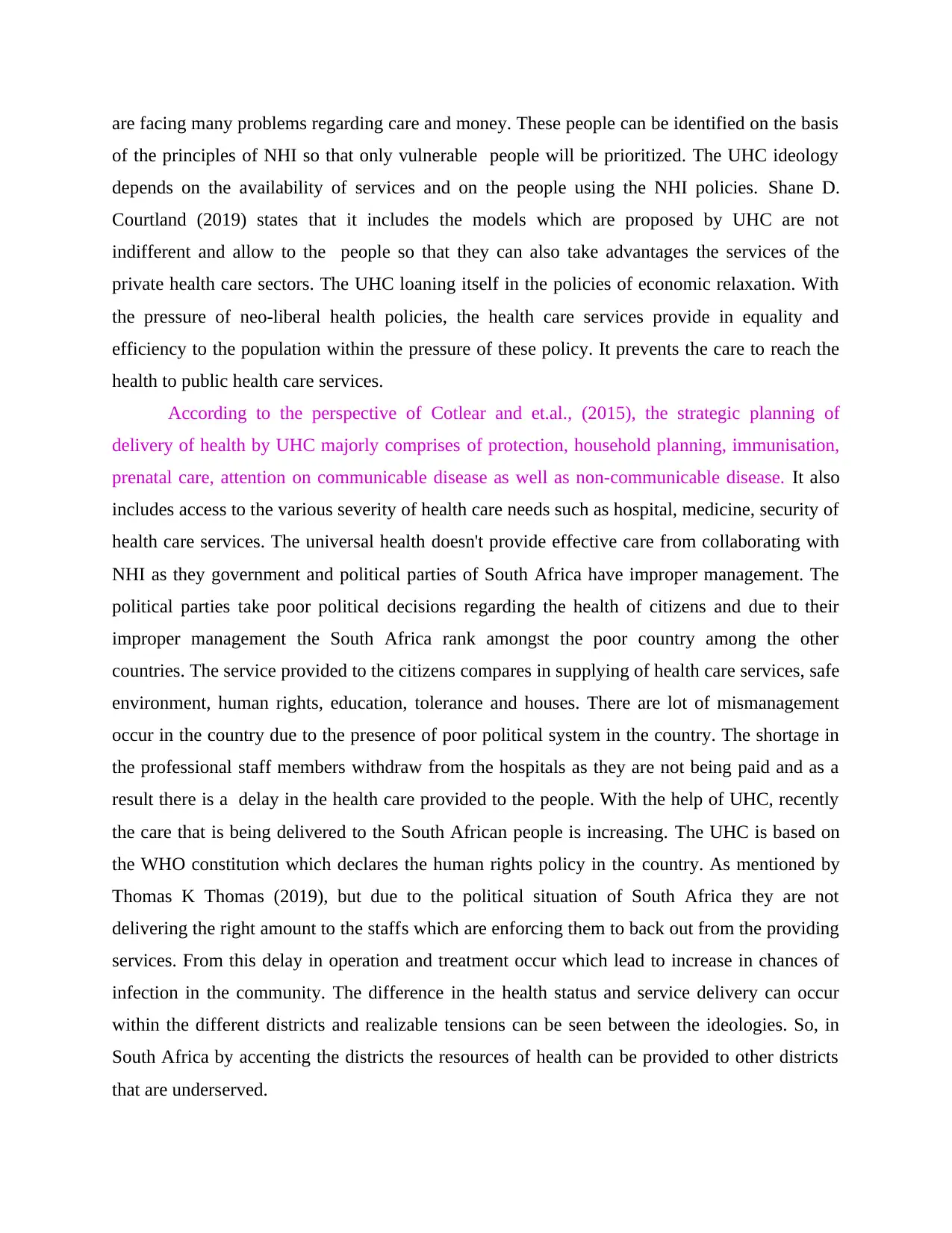
are facing many problems regarding care and money. These people can be identified on the basis
of the principles of NHI so that only vulnerable people will be prioritized. The UHC ideology
depends on the availability of services and on the people using the NHI policies. Shane D.
Courtland (2019) states that it includes the models which are proposed by UHC are not
indifferent and allow to the people so that they can also take advantages the services of the
private health care sectors. The UHC loaning itself in the policies of economic relaxation. With
the pressure of neo-liberal health policies, the health care services provide in equality and
efficiency to the population within the pressure of these policy. It prevents the care to reach the
health to public health care services.
According to the perspective of Cotlear and et.al., (2015), the strategic planning of
delivery of health by UHC majorly comprises of protection, household planning, immunisation,
prenatal care, attention on communicable disease as well as non-communicable disease. It also
includes access to the various severity of health care needs such as hospital, medicine, security of
health care services. The universal health doesn't provide effective care from collaborating with
NHI as they government and political parties of South Africa have improper management. The
political parties take poor political decisions regarding the health of citizens and due to their
improper management the South Africa rank amongst the poor country among the other
countries. The service provided to the citizens compares in supplying of health care services, safe
environment, human rights, education, tolerance and houses. There are lot of mismanagement
occur in the country due to the presence of poor political system in the country. The shortage in
the professional staff members withdraw from the hospitals as they are not being paid and as a
result there is a delay in the health care provided to the people. With the help of UHC, recently
the care that is being delivered to the South African people is increasing. The UHC is based on
the WHO constitution which declares the human rights policy in the country. As mentioned by
Thomas K Thomas (2019), but due to the political situation of South Africa they are not
delivering the right amount to the staffs which are enforcing them to back out from the providing
services. From this delay in operation and treatment occur which lead to increase in chances of
infection in the community. The difference in the health status and service delivery can occur
within the different districts and realizable tensions can be seen between the ideologies. So, in
South Africa by accenting the districts the resources of health can be provided to other districts
that are underserved.
of the principles of NHI so that only vulnerable people will be prioritized. The UHC ideology
depends on the availability of services and on the people using the NHI policies. Shane D.
Courtland (2019) states that it includes the models which are proposed by UHC are not
indifferent and allow to the people so that they can also take advantages the services of the
private health care sectors. The UHC loaning itself in the policies of economic relaxation. With
the pressure of neo-liberal health policies, the health care services provide in equality and
efficiency to the population within the pressure of these policy. It prevents the care to reach the
health to public health care services.
According to the perspective of Cotlear and et.al., (2015), the strategic planning of
delivery of health by UHC majorly comprises of protection, household planning, immunisation,
prenatal care, attention on communicable disease as well as non-communicable disease. It also
includes access to the various severity of health care needs such as hospital, medicine, security of
health care services. The universal health doesn't provide effective care from collaborating with
NHI as they government and political parties of South Africa have improper management. The
political parties take poor political decisions regarding the health of citizens and due to their
improper management the South Africa rank amongst the poor country among the other
countries. The service provided to the citizens compares in supplying of health care services, safe
environment, human rights, education, tolerance and houses. There are lot of mismanagement
occur in the country due to the presence of poor political system in the country. The shortage in
the professional staff members withdraw from the hospitals as they are not being paid and as a
result there is a delay in the health care provided to the people. With the help of UHC, recently
the care that is being delivered to the South African people is increasing. The UHC is based on
the WHO constitution which declares the human rights policy in the country. As mentioned by
Thomas K Thomas (2019), but due to the political situation of South Africa they are not
delivering the right amount to the staffs which are enforcing them to back out from the providing
services. From this delay in operation and treatment occur which lead to increase in chances of
infection in the community. The difference in the health status and service delivery can occur
within the different districts and realizable tensions can be seen between the ideologies. So, in
South Africa by accenting the districts the resources of health can be provided to other districts
that are underserved.
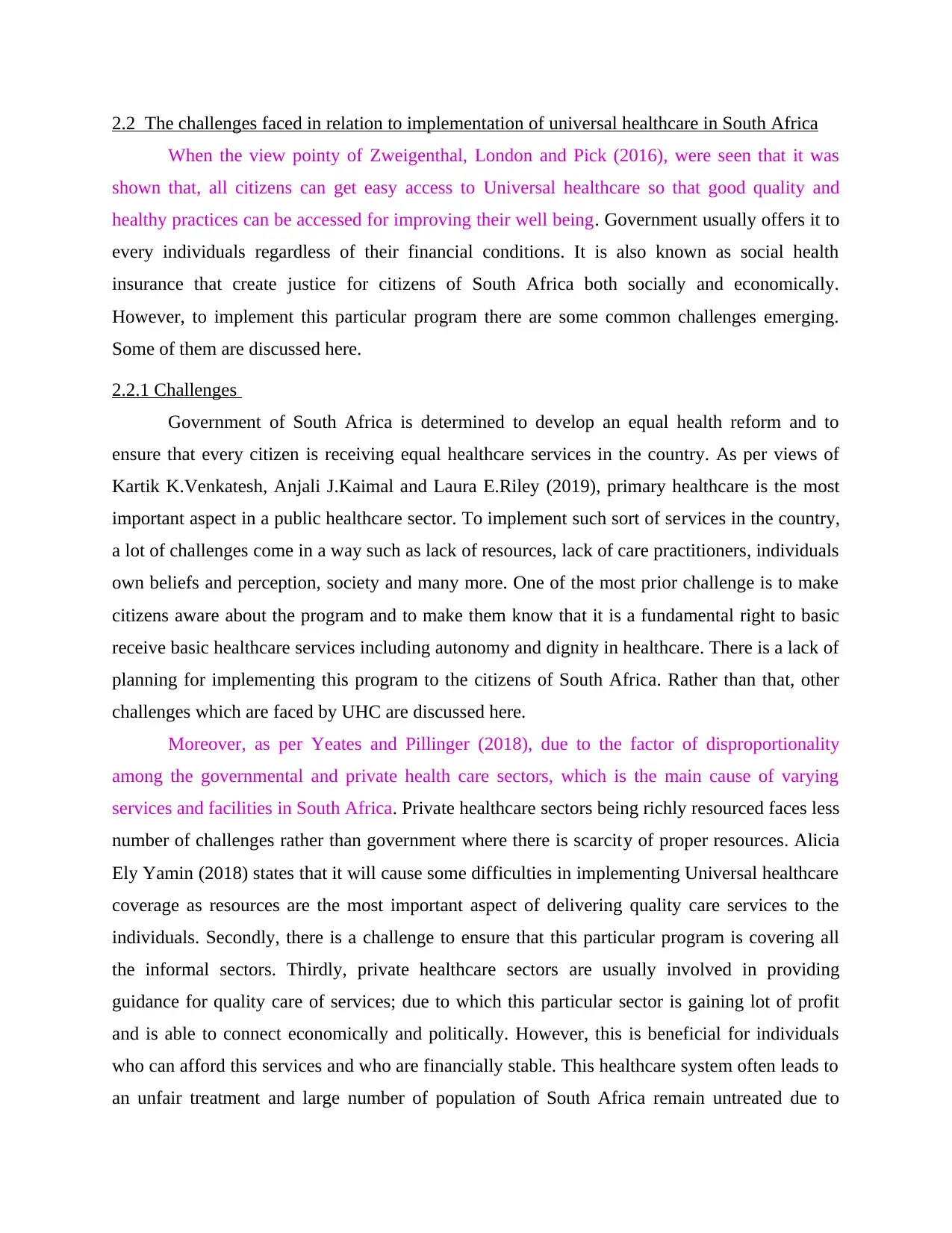
2.2 The challenges faced in relation to implementation of universal healthcare in South Africa
When the view pointy of Zweigenthal, London and Pick (2016), were seen that it was
shown that, all citizens can get easy access to Universal healthcare so that good quality and
healthy practices can be accessed for improving their well being. Government usually offers it to
every individuals regardless of their financial conditions. It is also known as social health
insurance that create justice for citizens of South Africa both socially and economically.
However, to implement this particular program there are some common challenges emerging.
Some of them are discussed here.
2.2.1 Challenges
Government of South Africa is determined to develop an equal health reform and to
ensure that every citizen is receiving equal healthcare services in the country. As per views of
Kartik K.Venkatesh, Anjali J.Kaimal and Laura E.Riley (2019), primary healthcare is the most
important aspect in a public healthcare sector. To implement such sort of services in the country,
a lot of challenges come in a way such as lack of resources, lack of care practitioners, individuals
own beliefs and perception, society and many more. One of the most prior challenge is to make
citizens aware about the program and to make them know that it is a fundamental right to basic
receive basic healthcare services including autonomy and dignity in healthcare. There is a lack of
planning for implementing this program to the citizens of South Africa. Rather than that, other
challenges which are faced by UHC are discussed here.
Moreover, as per Yeates and Pillinger (2018), due to the factor of disproportionality
among the governmental and private health care sectors, which is the main cause of varying
services and facilities in South Africa. Private healthcare sectors being richly resourced faces less
number of challenges rather than government where there is scarcity of proper resources. Alicia
Ely Yamin (2018) states that it will cause some difficulties in implementing Universal healthcare
coverage as resources are the most important aspect of delivering quality care services to the
individuals. Secondly, there is a challenge to ensure that this particular program is covering all
the informal sectors. Thirdly, private healthcare sectors are usually involved in providing
guidance for quality care of services; due to which this particular sector is gaining lot of profit
and is able to connect economically and politically. However, this is beneficial for individuals
who can afford this services and who are financially stable. This healthcare system often leads to
an unfair treatment and large number of population of South Africa remain untreated due to
When the view pointy of Zweigenthal, London and Pick (2016), were seen that it was
shown that, all citizens can get easy access to Universal healthcare so that good quality and
healthy practices can be accessed for improving their well being. Government usually offers it to
every individuals regardless of their financial conditions. It is also known as social health
insurance that create justice for citizens of South Africa both socially and economically.
However, to implement this particular program there are some common challenges emerging.
Some of them are discussed here.
2.2.1 Challenges
Government of South Africa is determined to develop an equal health reform and to
ensure that every citizen is receiving equal healthcare services in the country. As per views of
Kartik K.Venkatesh, Anjali J.Kaimal and Laura E.Riley (2019), primary healthcare is the most
important aspect in a public healthcare sector. To implement such sort of services in the country,
a lot of challenges come in a way such as lack of resources, lack of care practitioners, individuals
own beliefs and perception, society and many more. One of the most prior challenge is to make
citizens aware about the program and to make them know that it is a fundamental right to basic
receive basic healthcare services including autonomy and dignity in healthcare. There is a lack of
planning for implementing this program to the citizens of South Africa. Rather than that, other
challenges which are faced by UHC are discussed here.
Moreover, as per Yeates and Pillinger (2018), due to the factor of disproportionality
among the governmental and private health care sectors, which is the main cause of varying
services and facilities in South Africa. Private healthcare sectors being richly resourced faces less
number of challenges rather than government where there is scarcity of proper resources. Alicia
Ely Yamin (2018) states that it will cause some difficulties in implementing Universal healthcare
coverage as resources are the most important aspect of delivering quality care services to the
individuals. Secondly, there is a challenge to ensure that this particular program is covering all
the informal sectors. Thirdly, private healthcare sectors are usually involved in providing
guidance for quality care of services; due to which this particular sector is gaining lot of profit
and is able to connect economically and politically. However, this is beneficial for individuals
who can afford this services and who are financially stable. This healthcare system often leads to
an unfair treatment and large number of population of South Africa remain untreated due to
⊘ This is a preview!⊘
Do you want full access?
Subscribe today to unlock all pages.

Trusted by 1+ million students worldwide
1 out of 57
Related Documents
Your All-in-One AI-Powered Toolkit for Academic Success.
+13062052269
info@desklib.com
Available 24*7 on WhatsApp / Email
![[object Object]](/_next/static/media/star-bottom.7253800d.svg)
Unlock your academic potential
Copyright © 2020–2026 A2Z Services. All Rights Reserved. Developed and managed by ZUCOL.





